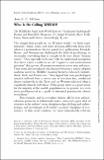Who Is He Calling WEIRD?
Author(s)
McCants, Anne EC
DownloadPublished version (168.6Kb)
Publisher Policy
Publisher Policy
Article is made available in accordance with the publisher's policy and may be subject to US copyright law. Please refer to the publisher's site for terms of use.
Terms of use
Metadata
Show full item recordAbstract
<jats:title>Abstract</jats:title>
<jats:p>In The WEIRDest People in the World, Henrich offers something of a big-think, global, social-science history that covers everything from psychology experiments to anthropological narrative, economic argumentation, and kinship studies, all grounded in a purported history of religious and family law. The book seeks to persuade that the West is cognitively different from the rest of the world and that its uniqueness explains every fundamental aspect of its modern trajectory—its wealth and education distributions, the progress and spread of its innovations, the presence or absence of trust outside its local communities, its formal institutions of democratic governance, and its beliefs about fairness and equality. Even more important for historically oriented readers, the book seeks to uncover how this major cognitive development emerged. The quantitative methods that the book employs to support its sweeping claims, however, are flawed, and its version of European church- and family-law history is inconsistent with the consensus view of specialist historians.</jats:p>
Date issued
2021Department
Massachusetts Institute of Technology. History SectionJournal
The Journal of Interdisciplinary History
Publisher
MIT Press - Journals
Citation
McCants, Anne EC. 2021. "Who Is He Calling WEIRD?." The Journal of Interdisciplinary History, 52 (2).
Version: Final published version